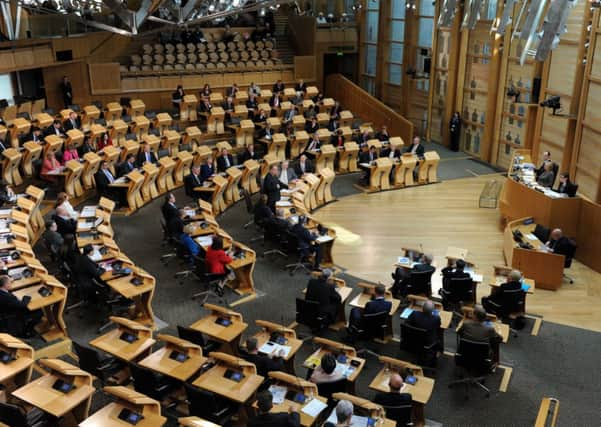Give voters ability to ‘sack’ MSPs - Sturgeon


She offered support for the proposal, which would allow people effectively to “sack” their elected representative, at a Law Society of Scotland conference on the referendum.
“I think the time has come to give the people more say and control over who represents them between elections - obviously they have the ultimate say at elections,” she told the audience of solicitors and legal professionals in Edinburgh.
Advertisement
Hide AdAdvertisement
Hide Ad“A recall provision has to be tightly and carefully drawn to prevent abuse, but we’ve seen through - particularly the expenses scandals - some quite outrageous situations where politicians behave appallingly and the electorate seem powerless to do anything about that.
“I would never be complacent about this, but the Scottish Parliament, after some very difficult early experiences around expenses, has largely got this more right than Westminster.”
She stressed that wider society should be involved in the writing of a constitution.
An interim constitutional platform is due to be published before summer to provide the “basic foundation” for Scotland to become an independent state, she said.
Ms Sturgeon gave her view after setting out her case for a Yes vote in the referendum on September 18.
The case for keeping Scotland in the UK was made afterwards by Alistair Carmichael, the Scottish Secretary in the UK Government.
Both politicians have a background in law.
The Deputy First Minister said: “For just a few hours between 7am and 10pm, when the polls are open, it is that simple. The Scottish people will be totally sovereign.
“Each and every one of us will have the control of our country’s future in our own hands. We’ll know shortly after the polling stations close whether we’ve kept control of our own country or handed it straight back to politicians at Westminster.
Advertisement
Hide AdAdvertisement
Hide Ad“I believe we should not and must not give that up. I believe it’s time for solicitors and indeed all of us in Scotland to say ‘Yes’.”
Mr Carmichael said he sets out a positive vision for remaining in the UK, highlighting the pooling of risks and opportunities across a larger state.
He also underlined his opposition to any deal to formally share sterling after a Yes vote.
“Deciding to leave and to go it alone is a choice that is open to us,” he said.
“But we must all realise and accept the realities that go with that choice.
“As part of the UK we have a stake in it. We can help to shape the UK today and the UK we will have tomorrow. If we leave it those decisions and that future will not belong to us.
“Those who support the Nationalist agenda would no doubt cheer this statement but personally I think we would be all the poorer for it right across the United Kingdom.”
Both speakers agreed there is a need to raise the tone of debate, with accusations on both sides of the campaign of mud-slinging and personal abuse.
Advertisement
Hide AdAdvertisement
Hide AdMs Sturgeon said: “Let me be as clear and emphatic and explicit and unequivocal as it is possible for me to be: I do not believe that people who take a different view from me in the referendum are anti-Scottish.
“I start from the premise that all of us on both sides of the debate want what is best for the country.”
She said Mr Carmichael is “as patriotic” as she is, inviting him and Better Together leader Alistair Darling to join the negotiation team after a vote for independence.
“At that point we are Scotland arguing the best case for Scotland,” she said.
“Just as we have all got a responsibility to raise the tone of the debate, we all have a very important responsibility to pull together after the decision is taken.”
Mr Carmichael said: “All too often we see anyone who dares raise a question or express a different point of view get shouted down, whether on radio, Twitter or even in our local communities. Lawyers are not immune to this either.”
SEE ALSO